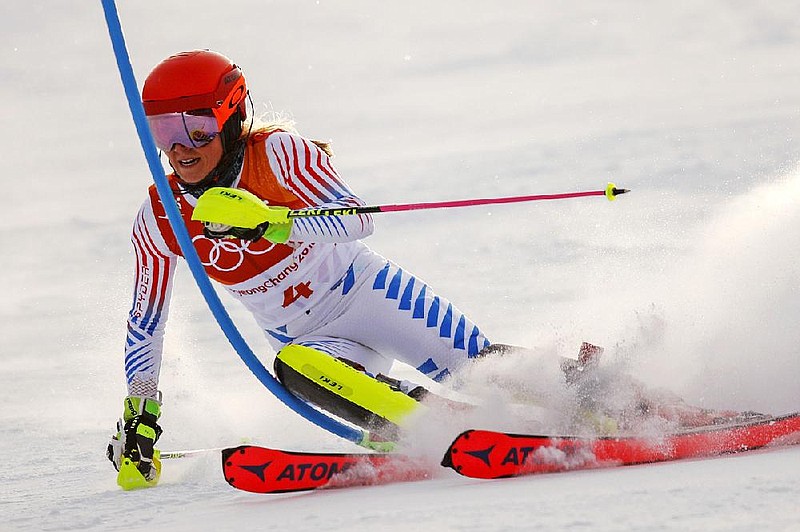PYEONGCHANG, South Korea — At the 2014 Sochi Olympics, Mikaela Shiffrin won the slalom, but in her only other event, the giant slalom, she finished fifth.
Shiffrin, then 18 years old, was peeved.
“The next Olympics I go to,” she said at the time, “I’m sure as heck not getting fifth.”
On Thursday, after three days of races postponed by strong winds, Shiffrin’s celebrated quest for multiple gold medals at the Pyeongchang Olympics finally began. And she emphatically lived up to her prophecy with a stirring, authoritative, come-from-behind victory in the giant slalom.
Roaring down a steep and especially taxing racecourse, Shiffrin was both the most aggressive and most technically sound skier. Despite a minor miscue in the race’s final 50 yards, her two-run time of 2:20.02 was 0.39 seconds ahead of Ragnhild Mowinckel of Norway. Italy’s Federica Brignone won the bronze medal.
“It’s more than another gold medal,” said Shiffrin, who joins Ted Ligety and Andrea Mead Lawrence as the only Americans to win two Alpine Olympic gold medals. “I knew I might win multiple medals at these Olympics but I also knew I could come away with nothing. Now I know that I’ve got one.”
But by winning in the giant slalom, which is her third-best event, Shiffrin has heightened her possibilities for three gold medals, which is the most any Alpine skier has won in any Olympics.
On Friday, she fell short in her attempt to defend her Olympic title in what is her strongest event, the slalom, finishing fourth. Next week, she will be favored in the Alpine combined, the last individual Alpine race of the Pyeongchang Games.
Shiffrin also indicated on Thursday that she was planning to race in a fourth event next week, the women’s downhill. Eileen Shiffrin, Mikaela’s mother and one of her coaches, said her daughter would not enter a fifth event, the women’s super-G, today.
Shiffrin’s giant slalom victory completes a portion of a four-year journey to transform herself into an elite racer in every Alpine event. But the first of the events she had to conquer was the giant slalom, a speedier and more changeable race than the slalom.
As Shiffrin said Thursday: “I’ve always had a love-hate relationship with giant slalom. It’s been a fight sometimes.”
Only months after the 2014 Sochi Games, Shiffrin began a dedicated training program to improve in the event.
But last month, she fell in her last giant slalom race and many in the ski racing community wondered if Shiffrin’s zeal to branch out to other events had left her distracted. Instead, she was convinced she needed to go back and work on the more basic techniques that she had studied and learned in the years since 2014.
In the two weeks since her tumble in her last giant slalom last month, she sequestered with her team of coaches and her mother. She rested some days and trained by herself in others.
“It was kind of a restart to the season and my skiing got better and better,” Shiffrin said. “I rediscovered some things during that training, which was important.”
Leaving the gate in her first run Thursday morning, Shiffrin was by far the fastest in the opening segment of the course. She lost some time in the middle of the course and rallied a bit at the end but still trailed the first-round leader, Manuela Mölgg of Italy, by 0.20 seconds.
She predicted after the first run that she could go faster in the second run, and she did, especially in the first 40 seconds after she left the gate. She soon opened a lead on the field that was nearly a full second, a stunning margin.
But within sight of the finish line, she skidded slightly and was knocked off-balance. It appeared she might have given the race away.
Afterward, Shiffrin would disagree. She said she had vowed to ski without fear all the way to the end of the race.
“I was not worried that I gave it away; I had just been a bit too aggressive,” she said, smiling. “But that’s what I wanted to do.”
